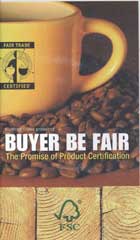
Buyer Be Fair 2006
Distributed by Bullfrog Films, PO Box 149, Oley, PA 19547; 800-543-FROG (3764)
Produced by Fox-Wilmar Productions
Directed by John de Graaf and Hana Jindrova
VHS, color, 57 min.
Jr. High - Adult
Business, Economics, Environmental Studies, Agriculture
Date Entered: 10/12/2006
Reviewed by Michael J. Coffta, Business Librarian, Bloomsburg University of PennsylvaniaWhile many documentaries dwell on the omnipresent maladies of globalization, Buyer Be Fair keenly demonstrates the efforts of two organizations to promote equitable pricing for commodities on the global market. While globalization has overwhelmingly pressured producers to raise crops cheaply and at the expense of the environment, organizations such as Transfair USA (for agriculture) and the Forest Stewardship Council (for timber) are creating pricing cooperatives to enable producers (such as family coffee farmers in Mexico) to sell their crops through the cooperative at a higher price. The producers must agree to raise their respective crops in environmentally responsible ways. When these products are sold on the market, they receive a stamp of certification from the cooperative to make known that the product was produced with environmentally safe practices and the producer receives a living wage as a result.
Despite prices of Fair Trade certified products often being twice as high as market prices, programs such these are experiencing a great deal of success. The documentary is filled with stories of producers escaping poverty, how ecosystems are being preserved, and consumers who are wildly pleased with their end products. The film emphasizes the power of the consumer in daily purchases. Though certified products cost more, many consumers in Europe and the United States are drawn to these products. This is not just a small-time phenomenon. Even mammoth companies such as Home Depot are buying certified lumber and actually prefer its quality. The film also forecasts how such certification may be applied to products and commodities other than coffee and timber.
This documentary offers many stories of conscientious retailers who refuse to make profits “on the backs of small farmers” and at the long term expense of the environment. When speaking of this film, Frances Moore Lappe, author of Diet for a Small Planet put it best by saying, “…the viewer feels empowered and not preached to.” Though these certification programs have a great deal of visibility to gain and need mainstream acceptance, this film brilliantly demonstrates the impact of certification on the environment, the marketplace, the economy, and the family farmer. This work deserves resounding applause for its enthusiastic, purposeful, and stirring exposition of this burgeoning movement. Buyer Be Fair is welcome viewing for all ages.